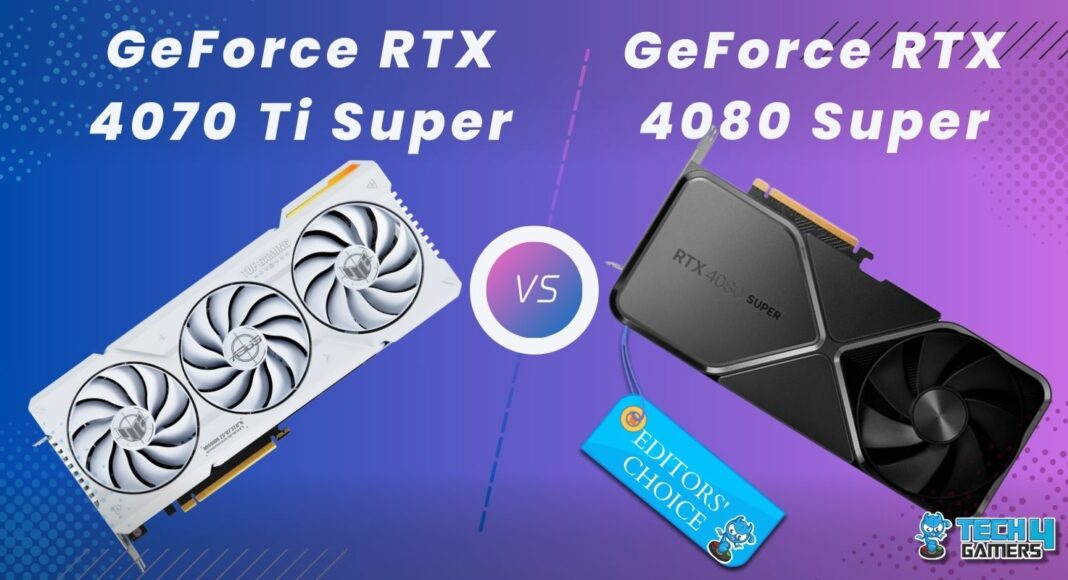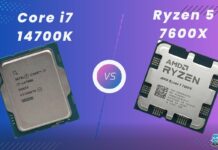Nvidia GeForce RTX 4080 Super
Rated: 9.4/10
Nvidia GeForce RTX 4070 Ti Super
Rated: 9.2/10
Pros And Cons
| GPU | Pros | Cons |
|---|---|---|
| Nvidia GeForce RTX 4080 Super | ✅ Superb 4K and 1440p performance ✅ $200 price drop from RTX 4080 ✅ Excellent Ray tracing and DLSS performance | ❌ Power efficiency could be improved ❌ Lack of new hardware, still uses AD103 |
| Nvidia GeForce RTX 4070 Ti Super | ✅ Competent 1440p gaming performance ✅ Power Efficient graphics card ✅ DLSS 3.5 enhances 4K gaming performance | ❌ Not good enough for some 4K games |
- When playing games at 1440p, the RTX 4080 Super performs better than the RTX 4070 Ti Super, exhibiting an advantage ranging from 15% to 20%.
- The RTX 4080 Super consumes about 10% more energy than the RTX 4070 Ti Super. In contrast, the RTX 4070 Ti Super demonstrates 8.2% higher thermal efficiency.
- In February 2024, the market prices for the newly launched RTX 4080 Super and RTX 4070 Ti Super closely align with their launch MSRPs.
- I recommend the RTX 4080 Super for excellent gaming and overall performance and the RTX 4070 Ti Super for its great performance-to-price ratio and better power and thermal efficiency.
Comparison Table
| Feature | Nvidia GeForce RTX 4080 Super | Nvidia GeForce RTX 4070 Ti Super |
|---|---|---|
| CUDA Cores | 10240 | 8448 |
| CUDA Capability | 8.9 | 8.9 |
| Tensor Cores | 320 | 264 |
| Ray Tracing Cores | 80 | 66 |
| Base Clock | 2.29 GHz | 2.34 GHz |
| Boost Clock | Up to 2.55 GHz | Up to 2.61 GHz |
| Memory Bandwidth | Up to 736.3 GB/s | Up to 672.3 GB/s |
| TDP | 320 watts | 285 watts |
| Maximum GPU Temperature | 90°C | 90°C |
| Best CPU | - | Best CPU For RTX 4070 Ti Super |
| Best Variants | Best RTX 4080 Super Graphics Cards | Best RTX 4070 Ti Super Graphics Cards |
Architectural Difference
- Architecture: The RTX 4080 Super and RTX 4070 Ti Super feature Nvidia’s most recent Ada Lovelace architecture that integrates trendy technologies to reach previously unattainable performance levels.
- GPU Chip: Coming to the chip used in GPU fabrication, the RTX 4070 Ti Super integrates an AD103-275-A1 chip, whereas the RTX 4080 Super uses an AD103-400-A1 chip. These chips are manufactured using a 5nm process technology at TSMC.
- VRAM: Nvidia offers a 256-bit 16GB GDDR6X memory with these two GPUs. The RTX 4080 Super has a 2 Gbps higher data rate and a 9.5% greater memory bandwidth than the RTX 4070 Ti Super.
- Clock Speed: The RTX 4070 Ti Super boasts a 2.2% higher base clock and a 2.4% enhancement in its boost clock compared to the RTX 4080 Super. However, the pixel and texture rates of the RTX 4080 Super are comparatively greater.
- Advanced Technologies: Regarding advanced technologies, the RTX 4080 Super and RTX 4070 Ti Super feature NVIDIA DLSS 3.5. The DLSS 3.5 employs Ray Reconstruction, a new AI model that produces ray-traced images of superior quality for demanding ray-traced games and applications.
The RTX 4080 Super and RTX 4070 Ti Super represent the peak of Nvidia’s graphics card innovation, featuring cutting-edge technologies to reach new heights in overall performance. In this article, we’ll comprehensively compare the RTX 4080 Super vs RTX 4070 Ti Super to determine which GPU provides the best overall value, performance, and efficiency.
Gaming Benchmarks
To assess the performance of the RTX 4080 Super vs RTX 4070 Ti Super accurately, I tested them in ten graphically demanding games at 1440p, separating them between five games with Ray Tracing enabled and five without.
Test Bench
The specifications of my test system were as follows:
- OS: Windows 11
- CPU: Intel Core i7 13700k
- Motherboards: MSI MEG Z790 ACE MAX
- RAM: G.Skill Trident Z5 RGB 32GB DDR5-6600 CL34 Kit
- SSD: XPG Gammix S70 BLADE 2TB NVMe
- PSU: Enermax Revolution D.F. X 1050W
- CPU Cooler: Arctic Liquid Freezer II 360
Ray Tracing Off
Avatar: Frontiers of Pandora

- Starting my benchmarks with Avatar: Frontiers of Pandora, I experienced 19.7% better performance with the RTX 4080 Super, which provided 79 FPS on average compared to the 66 FPS average of the RTX 4070 Ti Super.
- During the worst 1% performance time in this gameplay, the RTX 4080 Super provided 66 FPS (same as the average frame rate provided by the RTX 4070 Ti S), while the RTX 4070 Ti Super processed 58 FPS.
Call Of Duty: Warzone 3

- In Call of Duty: Warzone 3, the RTX 4080 Super produced 162 FPS on average, 20% better performance than the RTX 4070 Ti Super, which generated an average of 135 FPS.
- Considering the low 1% performance, the RTX 4070 Ti Super managed 109 FPS, while the RTX 4080 Super provided a superb 120 FPS.
Immortals of Aveum

- While playing Immortals of Aveum, the RTX 4080 Super averaged 84 FPS, outperforming the RTX 4070 Ti S’s average frame rate of 76 FPS by 10.5%.
- In the low 1% performance time of Immortals of Aveum, the RTX 4070 Ti Super managed 56 FPS, whereas the RTX 4080 Super soared to 62 FPS.
RoboCop: Rogue City

- During my RoboCop: Rogue City gameplay, the RTX 4080 Super notched an average of 84 FPS, outshining the RTX 4070 Ti Super’s 73 FPS by 15.1%.
- Coming to the low 1% performance in this gameplay, the RTX 4070 Ti Super delivered 59 FPS, while the RTX 4080 Super outperformed at 68 FPS.
The Last of Us Part 1

- In The Last of Us Part I, the RTX 4080 Super achieved 111 FPS, a notable 15.6% headway over the 96 FPS average the RTX 4070 Ti Super delivered.
- During the worst 1% performance time in The Last of Us Part I, the RTX 4070 Ti Super achieved 82 FPS, while the RTX 4080 Super surged at 95 FPS.
Ray Tracing On
A Plague Tale Requiem

- The first game I played with ray tracing was A Plague Tale Requiem, where the RTX 4080 Super defeated the RTX 4070 Ti Super by 18.2%. The RTX 4070 Ti Super turned an average of 77 FPS, while the RTX 4080 Super topped with its 91 FPS average.
- In terms of the low 1% frame rate, the RTX 4080 Super and the RTX 4070 Ti Super managed 59 FPS and 51 FPS, respectively.
Alan Wake 2

- In Alan Wake 2, the RTX 4080 Super hit 67 FPS on average, surpassing the RTX 4070 Ti Super’s 52 FPS average by 28.8%.
- Considering the low 1% frame rate, the RTX 4080 Super surpasses the RTX 4070 Ti by 26.7%. The RTX 4080 Super managed 57 FPS, whereas the RTX 4070 Ti Super mustered only 45 FPS.
Cyberpunk 2077

- During my gameplay of Cyberpunk 2077, I saw an 18.7% performance advantage while using the RTX 4080 Super. The RTX 4070 Ti Super produced 75 FPS on average, and the RTX 4080 surpassed them with its 89 FPS brilliant performance.
- Coming to the low 1% performance period, the RTX 4070 Ti Super hit 62 FPS, with the RTX 4080 Super peaking at 74 FPS.
Forza Motorsport

- While playing Forza Motorsport, the RTX 4080 Super maintained an average frame rate of 92 FPS, overtaking the RTX 4070 Ti Super’s average of 78 FPS by 17.9%.
- Regarding the low 1% frame rate, the RTX 4070 Ti Super hit 68 FPS, while the RTX 4080 Super reached 73 FPS.
Star Wars Jedi: Survivor

- In my last gameplay of Star Wars Jedi: Survivor, the RTX 4080 Super outperformed the RTX 4070 Ti S’ average of 83 FPS by 18.1% by rendering a superb 98 FPS average.
- During the lowest 1% performance time of this gameplay, the RTX 4070 Ti Super hit 67 FPS, while the RTX 4080 Super reached 75 FPS.
Overall Gaming Performance
Without Ray Tracing

Average Frame Rate
In my gaming assessments without ray tracing, the RTX 4080 Super showcased a significant boost, boasting an approximate 16.6% lead in performance compared to the RTX 4070 Ti Super. The RTX 4080 Super clearly outperformed the RTX 4070 Ti Super, which lagged at around 89.2 FPS by achieving an average of 104.0 FPS.
Low 1% Frame Rate
During the low 1% performance time of my gaming session without ray tracing, the RTX 4080 Super surpassed the RTX 4070 Ti Super by about 12.9%. The RTX 4070 Ti Super achieved a frame rate of 72.8 FPS, whereas the RTX 4080 Super maintained a higher average frame rate of 82.2 FPS.
With Ray Tracing

Average Frame Rate
In my gaming sessions utilizing ray tracing, the performance gap widened significantly between the RTX 4080 Super and the RTX 4070 Ti Super, with the former transcending the latter by a notable 19.7% margin. In this context, the RTX 4070 Ti Super delivered an average frame rate of approximately 73.0 FPS, while the RTX 4080 Super consistently maintained a superior average frame rate of 87.4 FPS.
Low 1% Frame Rate
In the low 1% portion of my gaming experience with ray tracing, the RTX 4080 Super outperformed the RTX 4070 Ti Super by approximately 15.3%. While the RTX 4070 Ti Super clocked in at 58.6 FPS, the RTX 4080 Super sustained a superior average frame rate of 67.6 FPS.
I find the RTX 4080 Super fantastic as its plenty of CUDA and tensor cores improve ray tracing efficacy and provide great gameplay and overall performance. In contrast, I like the RTX 4070 Ti Super as it offers exceptional value with its impressive balance of performance and affordability.
– Uzair Qureshi
Gaming Power Consumption
Game Nvidia RTX 4080 Super (W) Nvidia RTX 4070 Ti Super (W)
Avatar: Frontiers of Pandora 313 284
Call of Duty Warzone 3 265 253
Immortals of Aveum 254 231
RoboCop: Rogue City 283 252
The Last of Us Part 1 281 267
A Plague Tale Requiem 319 281
Alan Wake 2 311 279
Cyberpunk 2077 293 266
Forza Motorsport 275 243
Star Wars Jedi: Survivor 298 261
Average Power Draw 289.2 261.7
Winner: Nvidia GeForce RTX 4070 Ti Super
Gaming Temperatures
Game Nvidia RTX 4080 Super (°C) Nvidia RTX 4070 Ti Super (°C)
Avatar: Frontiers of Pandora 73 64
Call of Duty Warzone 3 69 66
Immortals of Aveum 67 62
RoboCop: Rogue City 71 65
The Last of Us Part 1 68 63
A Plague Tale Requiem 70 65
Alan Wake 2 73 67
Cyberpunk 2077 68 66
Forza Motorsport 67 61
Star Wars Jedi: Survivor 71 65
Average Gaming Temperature 69.7 64.4
Winner: Nvidia GeForce RTX 4070 Ti Super
Based on the data I’ve gathered, the RTX 4070 Ti Super maintained an average gaming temperature of 64.4°C, whereas the RTX 4080 Super ran hotter at 69.7°C. So, the RTX 4070 Ti Super demonstrates better thermal performance, driving the RTX 4080 Super by 8.2%. In case of GPU overheating, seek guidance from How To Lower GPU Temperature?
Price And Value
| Graphics Card | MSRP | Current Price |
|---|---|---|
| GeForce RTX 4080 Super | 💲999 | 💲999 |
| GeForce RTX 4070 Ti Super | 💲799 | 💲794 |
| Price Difference | 25.0% | 25.9% |
Final Verdict – What Do I Recommend
GeForce RTX 4080 Super: The RTX 4080 Super is a commendable GPU, delivering exceptional ray tracing performance and excelling in 4K gaming scenarios. It costs $200 less than the RTX 4080 and performs far better, thus saving money.
GeForce RTX 4070 Ti Super: The RTX 4070 Ti Super is a formidable mid-range high-performance GPU, excelling notably in 1440p gaming. Its utilization of DLSS 3.5 greatly strengthens ray tracing capabilities, elevating the visual experience. Furthermore, the robust 16GB GDDR6X memory module increases the GPU’s overall prowess.
Choosing between the RTX 4080 Super vs RTX 4070 Ti Super ultimately depends on your budget and preferences. I suggest the RTX 4080 Super for exceptional performance, and the RTX 4070 Ti Super for its outstanding performance relative to its cost.
Thank you! Please share your positive feedback. 🔋
How could we improve this post? Please Help us. 😔
[Comparisons Specialist]
I’m a passionate computer hardware expert specializing in CPUs and GPUs. With a lifelong curiosity for hardware and extensive hands-on experience, I provide valuable insights, practical advice, and in-depth analysis on these components. Engaging with the hardware community, I exchange knowledge and stay at the forefront of technological advancements.
Get In Touch: uzair@tech4gamers.com








